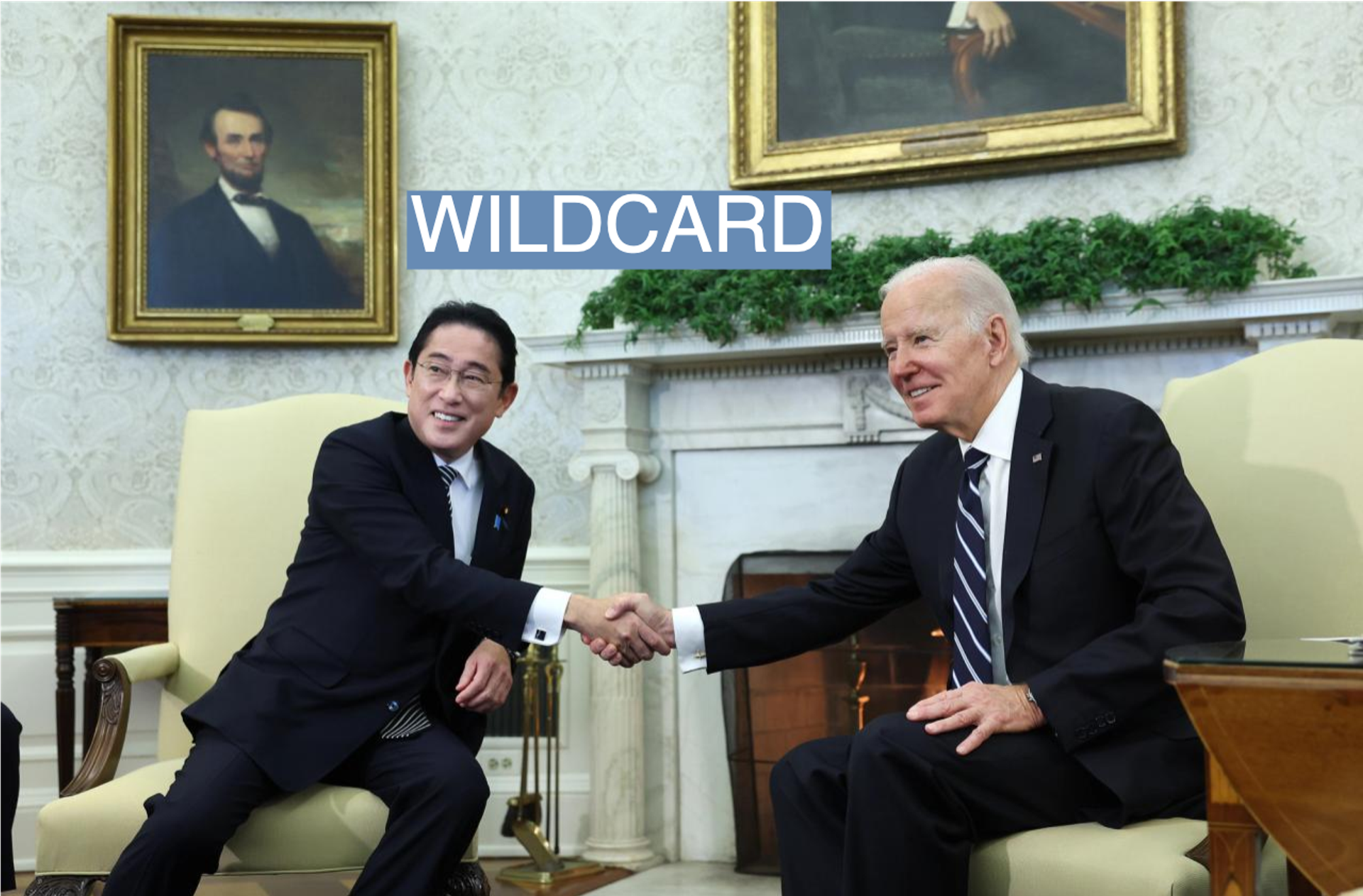The Scene
U.S. President Joe Biden and Japanese Prime Minister Fumio Kishida will meet today for a pomp-filled official visit where they’ll announce plans to strengthen military ties and join forces on space exploration. But for both governments, there’s an uncomfortable question quietly hanging over the event: What happens if one of these leaders loses their job?
In Japan, officials are wondering what a return of Donald Trump to the White House might mean for the trajectory of the two countries’ longstanding alliance. Meanwhile, Kishida’s own days could be numbered, as he tries to manage the fallout of a fundraising scandal and economic slowdown ahead of his party’s leadership contest in September. There’s already speculation he could face a snap election before then.
“There’s really just a lot of uncertainty,” said Tobias Harris, a Japan expert who runs the political risk firm, Japan Foresight.
In this article:
Know More
Biden and Kishida are expected to announce plans to change the U.S. command architecture in Japan to allow for closer and easier military cooperation, representing a major upgrade of the security partnership between both countries as they look to better counter China’s behavior in Asia. Other announcements are focused on security, space, and artificial intelligence cooperation.
But the political uncertainty facing both leaders has raised questions about how durable the major defense initiatives they’ve brokered together will turn out to be.
Rahm Emanuel, the U.S. ambassador to Japan, warned Monday during an event at the Center for Strategic and International Studies that efforts like the U.S.-Japan-South Korea dialogue could fall apart due to neglect, even if they aren’t shelved outright. “It’s early enough that unless you’re building on it constantly, it will atrophy,” he said.
There’s speculation but no clarity on who might replace Kishida as leader of the long-ruling Liberal Democratic Party, but there’s unlikely to be any sharp shift in posture towards the U.S. no matter who is in charge next year.
The View From Tokyo
Officially, the Japanese government says its ties with the U.S. will remain strong regardless of who occupies the White House.
“The Japan-U.S. relationship has been very solid irrespective of, transcending party affiliation. We consider our relations very firm,” Maki Kobayashi, a spokeswoman for Japan’s Ministry of Foreign Affairs, told Semafor during an interview last month in Tokyo. “On the Indo Pacific issues in general, I think we are on the same page.”
Trump also had a positive rapport with the late former Japanese Prime Minister Shinzo Abe, who was the first foreign leader to meet with the former president following his election in 2016. But it’s anyone’s guess whether Kishida — or any other potential leader, for that matter — would have the same luck working with him. “Given that personal connections to President Trump are so important, you know, that’s a question mark,” said Nicholas Szechenyi, an Asia expert at the Center for Strategic and International Studies.
There’s also concern in Japan about Trump’s intense focus on making sure U.S. allies share the burden of defense spending. Trump during his presidency put pressure on U.S. allies to spend more on defense. While much of the focus has been on his comments about European allies, Trump also reportedly asked Tokyo to pay more to cover the cost of U.S. troops stationed in Japan when he was president and also demanded higher defense contributions from another Asian ally, South Korea.
“Trump’s way of diplomacy or way of business is unpredictability. That’s the most serious problem for us as an ally,” Akihisa Nagashima, a member of Japan’s House of Representatives in Kishida’s Liberal Democratic Party, told Semafor last month. He noted he was already engaging informally with some “very, very smart” former Trump administration officials.
Morgan’s view
Despite the concerns, Japanese feelings about a potential return of Trump are more nuanced than they are in some nervous European capitals. After all, the Biden administration has, in many ways, stuck to and built on the first Trump administration’s Asia policies. Trump’s fond relationship with Abe has also given officials some confidence.
Japan’s decision to boost defense spending is also a helpful rhetorical weapon for Tokyo to quell doubts about its security commitments, experts say. Japan is currently undertaking a major defense buildup that will see defense spending rise to 2% GDP by 2027, as officials look to ward off North Korea, China, and Russia.
“I don’t think a second Trump presidency would be coming in with this view that somehow Japan is taking advantage of the U.S. security umbrella and not pulling its weight,” Lisa Curtis, a former Trump administration official and director of the Indo-Pacific Security Program at the Center for a New American Security, told me.
The circumstances of Wednesday’s meeting would seem to put added pressure on Kishida, who will also speak to a joint session of Congress on Thursday. The Japanese prime minister will be looking to telegraph Japan’s commitment to security to multiple audiences while also hoping for a domestic political boost out of the visit to the U.S. “His situation at home is just so difficult that I’m guessing this isn’t going to move the needle very much,” Harris told me.
Notable
The meeting between Biden and Kishida will take place following a rare rift over efforts by Japan’s Nippon Steel to buy U.S. Steel. Kishida said he doesn’t plan to raise the issue, Bloomberg reports. Biden’s opposition to the takeover is largely seen as an effort to maintain union support during the election.
Kishida’s visit puts the spotlight on the threat from North Korea, writes former Trump national security adviser John Bolton, who argues in The Wall Street Journal that neither Biden nor Trump is “fit to deal with Kim Jong Un’s rogue regime.”
There is a “pervasive sense of insecurity among Japan’s business and political elite” about a second Trump presidency, Lionel Barber writes in Politico.
